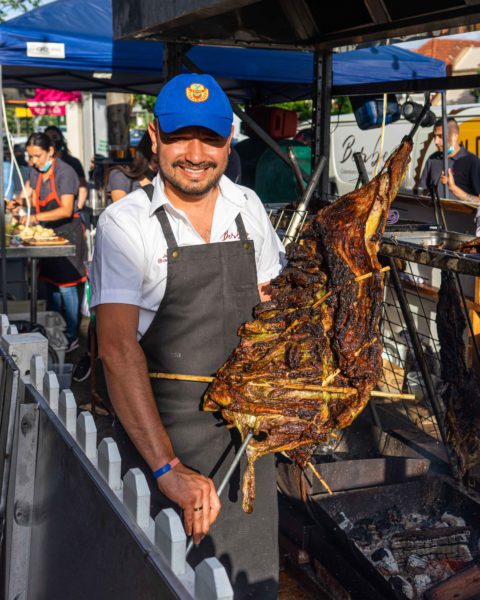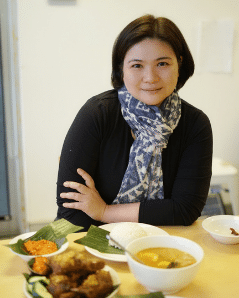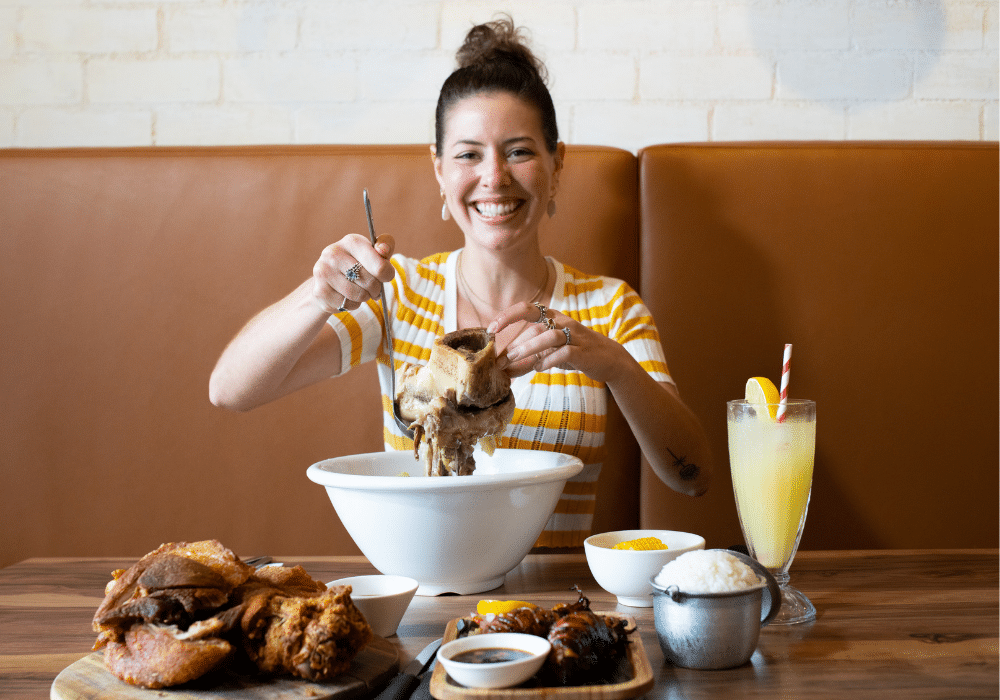Written by Sofia Levin.
With international travel on hold, Australians are turning to restaurants and cafes for a taste of life overseas. Culinary travel journalist Sofia Levin talks to a new generation of cooks finding business success in their own culinary heritage.
“What’s the weirdest thing you’ve ever eaten?”
I hear this question all the time – at restaurant launches, new business meetings and when someone slides into my DMs. It might seem harmless, but we need to start eating curiously instead of categorising cuisines as “other”.
Food is the simplest way to celebrate diversity. Over the last five years, Australians have been digging deeper and travelling further for experiential meals. In 2021 that doesn’t translate to dry ice domes and cocktails spritzed with perfume, but rather setting foot in a venue that transports you elsewhere. As diners become jaded by brunches barraged by Persian fairy floss and shallow trends, we crave something different. And what could be more different than eating an unfamiliar cuisine?
My ultimate definition of hospitality manifests in restaurants serving their cultural community while welcoming those beyond it. The next generation of cooks are opening venues and running pop-ups that share their cuisine with those yet to try it.
For Juan Berbeo, sharing Colombian food with Melburnians is his legacy. The Berbeo family has been in the restaurant and catering business for more than 50 years in Colombia, specialising in slaughtering, butchering and barbecuing whole pigs and cows. Juan and Sebastian opened Berbeo Bros at the end of 2019 in South Melbourne and are about to share their food from Diesel Bar in the city.

“I want to be able to show a good face of Colombia,” says Juan. “We’ve had so many bad stereotypes in the past with drugs and the cartels and I thought this was a great opportunity to change that, but also to be an ambassador because I know that Colombian food is something special.”
Before opening Berbeo Bros, Juan was head chef of Melbourne’s Pastuso and had worked at MoVida and Rockpool. As South American food became more popular, he wanted to shine a light on his region. Now he specialises in dishes like lechona, whole roasted pig stuffed with rice and peas, and perro caliente, a hot dog topped with pineapple sauce, crushed crisps and quail eggs.
“People already know what at empanda is, but South American food is starting to kick a bit more and I want to be part of that,” he says. “For me to be able to show that in Australia, it’s amazing to share that part of the culture.”
Mischa Tropp’s story is a little different. He dropped out of high school and went into the family food manufacturing business with his dad, before managing social enterprise kitchens. He started cooking Indian food in his mid-twenties during “a bit of an identity crisis.”
“The more I cooked it, the more I realised I didn’t know anything. Now that I’ve been doing it for six or seven years, I feel like I know even less,” he says. “It’s really hard to be disconnected from the community when you’re not born into it and you didn’t grow up in it.”

Mischa’s We Are Kerala pop-up dinners and residencies have helped him connect with his south Indian heritage. Originally he wanted to open a south Indian restaurant, but now he’s more driven by his hunger to learn about regional Indian cuisines.
“There are other things that I’m interested in learning about as well, like Nagaland and Assam,” he says. “In the ‘90s there was less of a connection to cultural things in Australia. It was very much fit-in-and-be-white. It’s only in the last 20 years that’s started to change.”
Corina Tan, on the other hand, has cooked Indonesian food for as long as she can remember. She opened Garam Merica in 2006, when her CV had her working at a bank with a Master in IT from Monash University.
“In Australia at university, you had to cook when you were missing something, because there were not a lot of Indonesian restaurants in ’95,” she says. “We always missed home, so we just tried to offer the familiar tastes when we are in Indonesia, and everyone loved it.”

Forty per cent of Corina’s customers are non-Indonesian, and she’s noticed a further boom since Australia’s borders have been closed. Her customers travel through food, especially Garam Merica’s signature nasi bungkus, fragrant rice wrapped in banana leaf with two meat and two vegetable dishes.
“It’s not only for Indonesian people. Some people know about it because they’ve been to Bali or Jakarta and a lot of Australians can experience what we have back in Indonesia at warung,” says Corina.
During lockdown, the team starts cooking at 4am to ensure that Melburnians have their nasi bungkus delivered by lunchtime. There are at least 24 dishes to choose from, including rendang, west-Sumatran grilled chicken and baby squid in ink.
“I try to introduce dishes that are not so popular because Indonesia has so many different tastes from different regions. When you come to Bali, Bandung, Jakarta, the taste is different, the protein is different, the technique is different. The variety is amazing,” says Corina.
Conversations of food and culture in Australia can’t be had without First Nation people. Despite using native ingredients for tens of thousands of years, the challenges of sharing it are in many ways greater than those faced by migrant communities. Much traditional knowledge has been lost or is difficult to access.
“If you asked me as a child what I want to be when I grow up, I would say I don’t know, because I didn’t know what the opportunities were for someone like me,” says Torres Strait Island-born Nornie Bero. “Now my generation is showing the next generation how to achieve these things, but we’re only starting now.”
Nornie has been in hospitality for 20 years, but only started Mabu Mabu, her indigenous ingredient-focused catering business and deli, in 2018. It moved to Yarraville and became a cafe in 2019. Big Esso restaurant will open in Federation Square come July.

Teaching Australians about Indigenous cuisine is important to Nornie, but she also wants to share it with Indigenous people who might not have had the opportunity to learn about their cuisine.
“I’m not saying we were here first, I’m saying we are here. I want this to be a positive message about how cool our culture is, where it’s done through food and makes people happy,” said Nornie. “It’s one thing to be an Indigenous business; it’s another to just be a business.”
These days if you ask me about the “weirdest” dish I’ve eaten, I’ll redirect you to inquire about the most interesting instead. I might tell you about handmade Mauritian noodles with mackerel that remind me of pungent puttanesca pasta, or my go-to bain-marie Padang lunch of dried beef lung when I’m missing Indonesia. Or perhaps I’ll recommend the ‘roo tail bourguignon from Mabu Mabu – that way you can tell overseas friends and relatives how you ate sustainable Australian protein using a French preparation while learning about Indigenous culture. That’s not weird; it’s downright exhilarating.
Head here to watch Nornie Bero chat with Sofia Levin about ancient native ingredients and her fascinating modern cafe, Mabu Mabu.

Read more of Sofia Levin’s culinary adventures at Seasoned Traveller, a website that celebrates cultural diversity through food.

